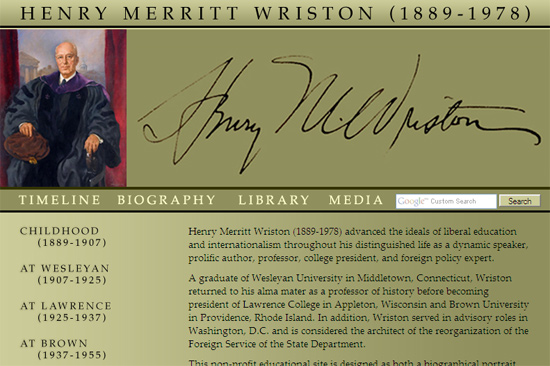Online Biographic Site of Wriston ’11 Debuts
 |
| Wesleyan’s Academic Media Studio created the website, www.henrymerrittwriston.org, in honor of Wesleyan alumnus Henry Merritt Wriston, B.A. ’11, M.A. ’12. |
| Posted 02/27/08 |
| This month Wesleyan’s Academic Media Studio premiered www.henrymerrittwriston.org, a biographical portrait of distinguished professor, college president, and foreign policy expert Henry Merritt Wriston, 11.
Created though support by the Wriston family, the non-profit educational site was designed to provide textual, visual and audile information about the life and work of Henry Merritt Wriston and serve as a research portal for scholars investigating liberal education, college administration, internationalism, domestic and foreign policy and more. The website presents a complete biography as well as an interactive timeline exhibiting nearly 200 original archival photographs organized according to five eras of Wristons life. It features links to additional resources and a library of more than 100 of Wristons speeches, articles, books, and letters spanning over six decades of his distinguished career. The information is organized by type, by topic, and by decade for user-friendly browsing, and the text has been made completely searchable using a custom Google search. In addition, the media section features five hours of audio clips of sample speeches of this dynamic speaker, as well as accounts of his life by his daughter Barbara, President Dwight D. Eisenhower, and others. Henry Merritt Wriston (1889-1978) advanced the ideals of liberal education and internationalism throughout his distinguished life as a dynamic speaker, prolific author, professor, college president, and foreign policy expert. A graduate of Wesleyan University (B.A. 1911, M.A. 1912), Wriston returned to his alma mater to serve as a professor of history (1914-1925). His doctoral dissertation, “Executive Agents in American Foreign Relations” (Harvard University, 1922) became a standard text in the U.S. Department of State. Wriston served as president of Lawrence College in Appleton, Wisconsin (1925-1937) and Brown University in Providence, Rhode Island (1937-1955), where his tenure had powerful transforming effects. At both schools he reorganized the curriculum to emphasize his commitment to liberal education, an ideal he first experienced at Wesleyan and later articulated in his best-known work, The Nature of A Liberal Arts College (1937). He has been called “the greatest president Brown ever had.” Wriston also maintained active roles in numerous educational organizations, including the first president of the Association of American Universities (1948-1950). In Washington D.C., Wriston served as chairman of President Dwight D. Eisenhower’s Commission on National Goals (1960), chairman of the Secretary of State’s Committee on Personnel (1954), and member of the U.S. Department of State’s Advisory Committee on Foreign Service (1956-1958), earning a reputation as the architect of the reorganization of the Foreign Service of the State Department. He was involved with many organizations dedicated to foreign policy and served as president of The American Assembly (1957-1963) and president of the Council on Foreign Relations (1951-1964). Wriston served as a trustee of many boards and was received numerous honors and 30 honorary degrees during his lifetime. His legacy includes his many writings and speeches, as well as The Wriston Fellowship at Brown, the Wriston Art Center at Lawrence, and the Henry Merritt Wriston Chair in Public Policy at Wesleyan. |
| By Mariah Klaneski BA ’04 MA ’07 and David Pesci, director of media relations |

